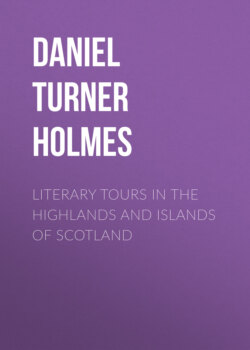Читать книгу Literary Tours in The Highlands and Islands of Scotland - Daniel Turner Holmes - Страница 16
На сайте Литреса книга снята с продажи.
NOTES ON LEWIS.
ОглавлениеTable of Contents
The great island of Lewis, formerly so distant from Edinburgh and Glasgow, can now be reached in fourteen hours by one who leaves the latter city at 5.40 A.M. The old route was very tiresome and circuitous: the traveller had to proceed to Inverness, take the Dingwall and Skye line to Strome Ferry, and then sail over the Minch to Stornoway. The opening up of the West Highlands by the railway to Mallaig has changed all that. At Mallaig pier, when you leave the train, you find the connecting steamer ready to set off, at noon, for its journey to Stornoway, where it arrives about eight in the evening.
I don't think anyone would want to stay more than a week at a time in Stornoway. The town itself is just like the fishy part of Boulogne-sur-Mer, only more so. There is a pervading odour of mussels, bait, and herring, and the gulls go flapping overhead in crowds everywhere. If the tourist remained a week in the place, he would go every day to the Castle grounds. Here, if anywhere, is the paradise of the Lews. There is a profusion of dells, burns, glades, ivy-grown bridges, and far-extending vistas over sea, moorland, and town. As with a knife (so precise is the division) the well-wooded policies are separated from the barren and disheartening moor. When one gets to the highest point of the grounds and gazes over the long, tiresome slopes of the island, one's belief in design in nature gets a sudden stab. A man will think long and sore before he arrives at any raison d'être for including such a wilderness of bogs in the scheme of creation.
The men of the island are, in the main, shrewd, resourceful, and intelligent—qualities fostered by their constant fighting with the sea. "The young fellows here," said one of the hotel-keepers to me, "will either make a spoon or spoil a horn. They come to a decision speedily and put it into practice at once. It is hit or miss with them, usually hit. At sea, in a gale, there is no time for parliamenting; and Lewismen act on land with the swift decision that is needed in a tempest." All round the coast are fishing-villages, thickly populated by these intrepid children of the tempest.
Fishing is a precarious industry, and often fails. The harvest of the land may fail at the same time as that of the sea: in such a case the plight of the islanders is sad indeed. During the last five years, the trade of weaving has been wisely fostered by the Government, so that in future, when sea and soil are churlish, the loom will to some extent supply the lack. The Duchess of Sutherland and the Congested Districts Board have done excellent service in encouraging the tweed-weaving industry all over the Long Island. Her Grace, some years ago, made a progress through Lewis and addressed the people by means of an interpreter, on the advantages of such industry in their homes. She also instituted exhibition sales of work in the big cities of the south, with the result that large quantities of cloth were sold and a precious publicity given to the scheme. Depots for receiving the cloth from the workers are now established in Stornoway and Harris. The Congested Districts Board advance money without interest for the purchase of looms, provide an experienced instructor to supply the people with new patterns, and give an adequate supply of dye-pots free of charge. This instructor goes over the whole of Lewis and Harris, spending month about in each, erecting new looms and modernising old ones. There is a large carding mill in Stornoway, where the natives can have the wool expeditiously carded in the most approved modern style. An industry thus fostered and supervised is bound to succeed.
Educationally, the Long Island is making great progress. Higher education is almost entirely centred in the Nicolson Institute, Stornoway, a school admirably conducted and finely equipped. The pupils of marked ability in the elementary schools of Lewis come here to continue their higher studies, and, in many cases, to prepare themselves for the University. I have seen specimens of a magazine, annually put forth by the senior pupils of this school, and containing many interesting essays and poems, grave and gay. The English of the essays was remarkably good, and contained here and there some piquant suggestions of Gaelic idiom. The pupils read French well, probably because their native Gaelic contains such a rich reservoir of nasal sounds to draw upon.
